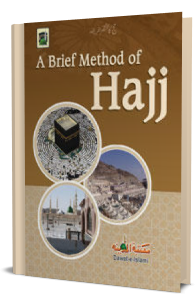
Statements of our Pious Predecessors
Ṣadr al-Sharīʿa's Advice to Pilgrims
Mawlana Hafeez al Rahman Attari Madani
The erudite Hanafi jurisconsult, Mufti Amjad ꜤAlī al-AꜤẓamī رَحْمَةُ الـلّٰـهِ عَلَيْه was a prolific author, respected researcher, scholar of hadith, jurist, and teacher. He was from the spiritual caliphs of the reviver of Islam, Imam Aḥmad Razā Khān رَحْمَةُ الـلّٰـهِ عَلَيْه. His Bahār-i SharīꜤat is a renowned manual of fiqh. He passed away on the 2nd of Dhū al-QꜤadah.
In Bahār-i SharīꜤat, Mufti Amjad ꜤAlī al-AꜤẓamī رَحْمَةُ الـلّٰـهِ عَلَيْه shares 84 counsels, 48 of which are taken from al-Fatāwā al-Riḍawiyya. He selected counsels which addressed the needs of pilgrims in his era. We share 22 of them which are relevant for pilgrims today. From the moment they depart until they return home, these points will benefit the pilgrim throughout his sacred journey.
Before Departing
1. If you owe money or have a trust, repay it. If you have taken someone’s wealth unjustly, compensate them or seek their pardon. If you cannot locate the person, give that amount of money to the poor.
2. It is disliked to travel without seeking permission from the relevant people beforehand. So, seek permission from your father, mother, spouse, etc. An obligatory Hajj cannot be prevented by the denial of permission. Try to gain permission, but if you are unsuccessful, you should still travel.
3. This journey should be solely for the sake of Allah Almighty and His Prophet صَلَّى الـلّٰـهُ عَلَيْهِ وَاٰلِهٖ وَسَلَّم and free of ostentation.
4. Use halal wealth for this cause. Otherwise, there is little hope of the Hajj being accepted, even if the obligation is fulfilled. If there is doubt in the purity of your wealth, borrow some money, and use this money to perform Hajj. Then repay the debt with your original wealth.
5. Take more provisions than required and use them to help your fellow pilgrims and donate a portion to the poor and needy. This is a sign of an accepted Hajj.
6. Visit friends and family and seek their forgiveness. Now, it will be necessary for them to sincerely forgive you. It is mentioned in a Hadith: Whomsoever is approached by his Muslim brother with an apology, it is necessary for him to accept it. Otherwise, he will be deprived of standing at the Fount of Kauthar.[1]
7. Ask everyone to pray for you; you will receive immense blessings from this. There is more hope that the supplications of others will be accepted, and one does not know whose supplication will be accepted.
8. Leave the religion of your family, their lives, wealth, health, and well-being in the care of Allah Almighty.
9. Give charity before and after leaving your home.
10. Take your travel essentials with you and take advice from someone with knowledge and experience of Hajj.
11. Leave your house happily, perform dhikr in abundance, and always keep the fear of Allah Almighty in your heart. Refrain from anger, display forbearance when provoked by people, be at peace, and do not engage in useless matters.
During the Journey
12. Treat the Bedouins and the Arabs with kindness. If they address you harshly, be patient, for this is a means of gaining the Prophet’s intercession.
13. Sometimes, those who do not understand Arabic are taken advantage of and verbal abuse is hurled at them. In this scenario, be patient and do not reciprocate. Do not harbour hatred in your heart. Similarly, the people of Makka may be harsh. Respond to their harshness with kindness.
14. There are three conditions for the acceptance of Hajj. Allah Almighty states:
فَلَا رَفَثَ وَلَا فُسُوْقَۙ-وَلَا جِدَالَ فِی الْحَجِّؕ
“There should be no obscene talk, disobedience, and quarrelling in Hajj.”[2]
You must distance yourself from these matters. If you become angry, a dispute arises, or a sinful thought enters your mind, lower your head at once, focus on your heart, recite the above-mentioned verse, and say lā ḥawla wa lā quwwata illāh billāh. (لَا حَوْلَ وَلَا قُوَّةَ إِلَّا بِالـلّٰــه).
15. Fill the journey with supplications for yourself, friends, and family, as the traveller’s supplication is accepted.
16. When facing difficulties and in need of assistance, say the following three times:
یَا عِبَادَ اللہِ اَعِیْنُوْنِیْ
“Dear pious servants of Allah! Help me!”[3]
According to the hadith, this call will bring you help from the unseen.
17. If you have misplaced something, recite:
یَا جَامِعَ النَّاسِ لِیَوْمٍ لَّا رَیْبَ فِیْہِ ؕ اِنَّ اللہَ لَا یُخْلِفُ الْمِیْعَادَ اِجْمَعْ بَیْنِیْ وَبَیْنَ ضَالَّتِیْ
“O Gatherer of people on the Day in which there is no doubt. Indeed, Allah does not go against His promise. Reunite me with my lost possession.”
You will find your lost possession, اِنْ شَــآءَالـلّٰـه.
Returning from Hajj
18. Inform your family in advance about your arrival time and date. Never return unannounced, especially at night.
19. People should welcome pilgrims and request their supplications before they return home, as the supplications of the pilgrim are accepted until he sets foot in his home.
20. Upon returning, first offer two cycles of prayer in your local masjid.
21. Perform two cycles of prayer at home, then meet everyone cheerfully.
22. Bring gifts for your friends and family. What can be a greater gift than a blessed memento from the holy sanctuaries? The second gift is to supplicate, before your return, for the Ummah and the people who will welcome you back.[4]

















Comments